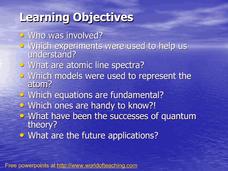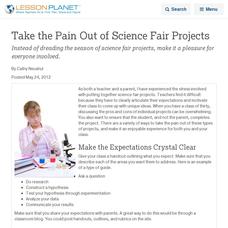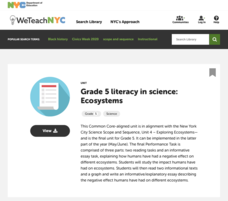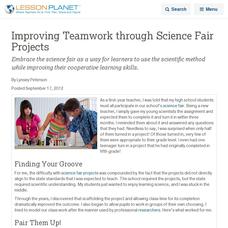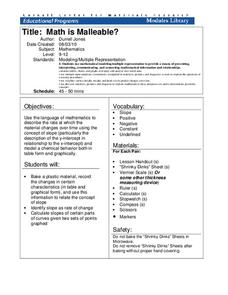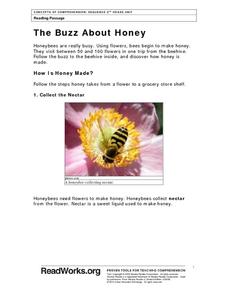NASA
Photons in the Radiative Zone: Which Way Is Out? An A-Maz-ing Model
Can you move like a photon? Young scholars use a maze to reproduce the straight line motion of a photon. The second in a six-part series of lessons on the sun has learners measure angle of incidence and refraction to determine the path...
Curated OER
Quantum Mechanics
Mostly what you will find here is a history of quantum mechanics. Influential scientists are introduced (along with some of their recorded quotes), the progression of atomic models is reviewed, and finally experssions and equations are...
Exploratorium
Indicating Electrolysis
Sure, your learners know water is made up of two molecules, but watching them separate helps the class see the construction like never before. This resource provides directions on how to build a simple electrolysis device using a...
Curated OER
Take the Pain Out of Science Fair Projects
Instead of dreading the season of science fair projects, make it a pleasure for everyone involved.
Scholastic
Study Jams! Fossils
By viewing and reading these slides, your precious paleontologists learn what makes a fossil and what scientists can learn by studying them. Consider giving the website to pupils as homework. They can read the slides, take an assessment...
Virginia Department of Education
Current Applications in Science
High schoolers may claim to have no interest in scientific revelations and discoveries, but watch how quickly they download a new app onto their state-of-the-art smartphones. Scholars discuss the scientific or technological...
New York City Department of Education
Grade 5 Literacy in Science: Ecosytems
How do humans affect ecosystems? Learners read two articles and interpret a graph to develop essays on the human impact on ecosystems. They read about human impact on tigers and manatees as a basis for their overarching papers.
Curated OER
Dinnertime for Animals
Is a deer an herbivore? What about a spider? Experiment with the food chain in an interactive science experiment. After listing the herbivores from a selection of animals, third and fourth graders compare the skulls and teeth of...
Curated OER
Improving Teamwork through Science Fair Projects
Embrace the science fair as a way for learners to use the scientific method while improving their cooperative learning skills.
Museum of Science
Roller Coaster
Take a marble out for a roll. Using a section of flexible tubing, pupils build a roller coaster that will allow for a marble to act as the car. Learners create a loop, hill, and jump in their coasters by taping the tubing to different...
Virginia Department of Education
Thermochemistry: Heat and Chemical Changes
What makes particles attract? Here, learners engage in multiple activities that fully describe colligative properties and allow the ability to critically assess the importance of these properties in daily life. Young chemists...
Virginia Department of Education
Building a DNA Model
It has been decades since the discovery of DNA. Still, activities such building this DNA model allow blossoming scientists to better understand the components that form this overall structure. During this activity, they will also...
CK-12 Foundation
Scientific Models: Mathematical, Physical and Conceptual
This is one super model interactive! Middle and high school science scholars examine scientific models through a simple resource. Guided, hands-on practice allows them to classify conceptual, mathematical, and physical models. Other...
CK-12 Foundation
Location and Direction: Angle from the Equator
From any angle, this interactive is helpful. Earth science super stars explore a location's angle from the equator through a hands-on activity. Questions guide learners as they test their knowledge of direction and geometry used in...
CK-12 Foundation
Location on the Earth: Longitude and Latitude
To what degree do learners understand coordinates? Get them some practice in Yosemite National Park in a simple, fun interactive. Pupils explore a map and locate coordinates of popular sights within the park, then answer questions...
CK-12 Foundation
Direction on the Earth: Using a Compass
Navigate the world of orienteering in an informative interactive. Earth science scholars learn practical direction skills, such as proper polar coordinates and pairing compasses with maps. The interactive map allows them to practice...
CK-12 Foundation
Satellites, Shuttles, and Space Stations: Satellites in Orbit
Blast off! How do satellites, space shuttles, and space stations escape Earth's gravity and achieve orbit? Young astronauts study rocket science (literally) with an interactive lesson. They discover the four main uses for satellites, how...
Curated OER
Temperature and the Earth's Atmosphere
Earth science super stars visit the National Earth Science Teachers Association's interactive website to glean information on the layers of the atmosphere. Data tables are provided for them to record what is collected. This assignment...
Virginia Department of Education
Cell Division
Searching for simple ways to teach mitosis to high schoolers? Using colored chalk and onion root tips, pupils visually demonstrate what they view when looking through the lens of a microscope. There are also various ways to expand the...
Cornell University
Math Is Malleable?
Learn about polymers while playing with shrinky dinks. Young scholars create a shrinky dink design, bake it, and then record the area, volume, and thickness over time. They model the data using a graph and highlight the key features of...
Curated OER
Disease, Environment, Health, Human Populations, and Modern Technology
What is a pandemic, epidemic, and a vaccine? What changes have occurred in health and environmental awareness with the advent of new technology? This 20 question multiple choice quiz asks kids to answer who, what, when, and where about...
Curated OER
Double Replacement Reactions
There's not much to this presentation, but what is here can be useful. The main slide, which is inexplicably repeated, simply shows an example of both a single-replacement and a double-replacement reaction and then their general forms....
Massachusetts Institute of Technology
List of Chemicals in Space
What is space made of? It turns out that there are many compounds found in space! The 10th lesson of a science series provides a list of the compounds found in space and asks young scholars to research the characteristics of these...
Curated OER
The Buzz About Honey
What's the buzz these days? Learn some fun and interesting facts about honeybees with an informational reading passage, including the steps for successful pollination and honey creation.
Other popular searches
- What Is Science
- What Is Science?
- What Is Earth Science
- What Is Environmental Science
- What Is Science Important
- What Is Physical Science
- What Is Life Science
- What Is Science Worksheets
- What Is Work in Science
- What Is Science Fiction
- What Is Earth Science?
- What Is Science Worhsheets

